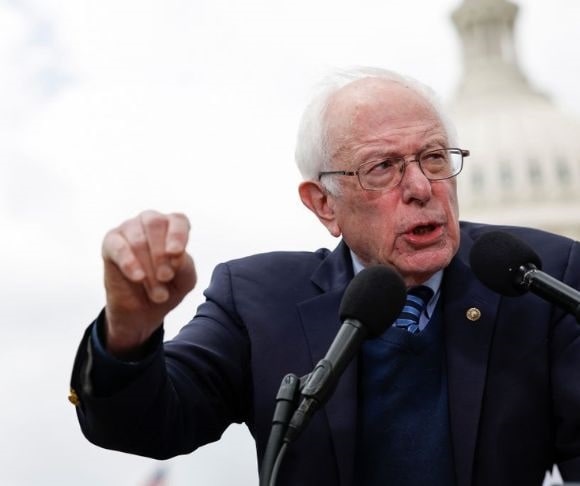A weekend at Bernie’s is not what it is cracked up to be. From folding Che Guevara t-shirts that came out of the dryer to playing with the hammer and sickle plastic toys from Fisher-Price, it can be a challenge to spend time with Sen. Bernie Sanders (I-VT) any day of the week, especially when he clouds your sense of logic and rationality with a foul odor of inane economic ideas that were supposedly tossed into the dustbins of history. But, so far this year, the socialist millionaire senator has presented a couple of proposals he believes would cure poverty.
Bernie Sanders and the Minimum Wage
In May, the famous progressive senator urged his colleagues to raise the national minimum wage to $17 per hour, warning that there would be “political consequences” for lawmakers who oppose this plan. Sanders wants to boost the minimum wage to $17 over a five-year period, or by 2028. “Nobody in this country can survive on $7.25 an hour,” he said. “Nobody should be forced to work for starvation wages.”
This might be hard to fathom, but he is right. Since the COVID-19 public health crisis, inflation has gotten out of hand, with real wages (inflation-adjusted) entrenched in negative territory for the past two years. But, of course, this is the consequence of the exact fiscal and monetary mechanisms Sanders has endorsed throughout his career, be it spending too much or printing astronomical amounts of cash.
However, there are two things worth mentioning when discussing the minimum wage. First, according to the Bureau of Labor Statistics, since the government started tracking this data in 1979, the private sector has voluntarily paid more than the minimum wage. Second, the average hourly wage is far beyond $17 because of a labor shortage today. In May, average hourly earnings topped $33 as employers struggled to fill positions. Third, evidence has highlighted that higher minimum wages typically hurt the people it is meant to help. Finally, a combination of raising the minimum wage and businesses being unable to find workers could exacerbate automation efforts in the service sector.
Ultimately, it is a case of something old (basic economics) and something new (market developments).
That said, political observers think the Sanders suggestion will be unable to make it far in the upper chamber as a few of his Democratic colleagues are up for re-election over the next year, such as Sen. Joe Manchin (D-WV) and Sen. Jon Tester (D-MT). In addition, Sen. Kyrsten Sinema (I-AZ), a Democrat until recently, is also up for a tough re-election race.
Eradicating Wealth
Should the US government impose a 100% tax on incomes over $1 billion? Sen. Sanders thinks so. Speaking in an interview with HBO Max’s Who’s Talking to Chris Wallace, the democratic socialist conceded that billionaires should not exist and that the state needs to confiscate their wealth.

Bernie Sanders (Photo by Anna Moneymaker/Getty Images)
“Are you basically saying that once you get to $999 million, the government should confiscate all the rest?” the host asked. Sanders responded: “Yeah,” adding, “You may disagree with me, but I think people can make it on $999 million. I think that they can survive just fine.”
Before we dive into this proposal’s economics, some findings must be pointed out to show how much the broader public endorses this type of policy. A 2020 Reuters survey learned that Americans believe the rich need to “contribute an extra share of their total wealth each year to support public programs.” A 2022 YouGov poll found that 57% of Americans say US billionaires were taxed too little. A recent Just Capitalism study discovered that most Americans think corporate CEOs are compensated too much.
But here are a few counter statistics. The top 1% of earners (incomes over $548,336) account for a fifth of all income, but they paid 42% of all income taxes in 2021. Moreover, the top 0.1% cover roughly 20% of all income taxes paid, paying a more significant share than the bottom 75% of taxpayers combined. Despite purporting that the current tax code is rigged in favor of the affluent, one-third of US taxpayers possess zero income tax liability amid credits and deductions, meaning they receive enormous government transfer payments without contributing to the system.
Liberty Nation’s Graham Noble also crunched the data, writing in March 2023: “The bottom 50% of earners paid 2.3% of federal income tax revenues for 2022. The top 50% accounted for the other 97.7%. Average federal income taxes paid in 2022 by the top 1% was $458,894. The bottom 50% paid, on average, $504.”

Elon Musk Photo by Clive Mason – Formula 1/Formula 1 via Getty Images)
For the broader argument, slapping a 100% penalty on anyone earning $999 million would gradually leave the US economy vulnerable to capital flight and sluggish growth. Many anti-wealth individuals think that the Elon Musks, Jeff Bezos, and Warren Buffetts of the world leave their money in a bank account collecting interest. But they invest in companies, resulting in more goods and services, capital formation, and new workers. Musk made the bulk of his fortune from Tesla Motors. If politicians and bureaucrats confiscated his earnings, how would he invest in his suite of ground-breaking companies, like Neuralink, SpaceX, The Boring Company, and OpenAi?
Greed Is Good for the Government
Anyone who has ever looked at Uncle Sam’s budget realizes that the government does not have a revenue problem. It has a spending issue. Except in the fiscal year 2020, tax receipts have increased yearly since 2009, topping $4 trillion in 2021. By comparison, federal net outlays have skyrocketed since the 1970s (interestingly enough, when the US government officially abandoned the gold standard). Sanders and his allies will never be content with the size of the Leviathan. They will always want more. It begins with universal healthcare and expands to a universal basic income overnight, demanding greater levels of taxes, borrowing, and printing. And yet, it is everyone else who is greedy. It is comparable to what legendary economist Thomas Sowell once wrote, “People who are forever ready to charge others with ‘greed’ never apply that word to the government.”




